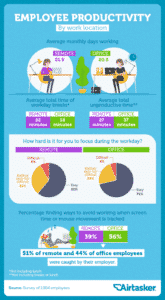Many businesses and employees have been forced to work remotely of late. Yet, despite this, no one seems to understand what it actually takes to work remotely. Most people can’t do it. They don’t have the right mindset or self discipline . Of course, these days, no one, especially politicians, cares about that. In a recent study done by gig economy platform company Airtasker, they went out to see what is working and what isn’t. The following intel is taken directly from their survey results:
- Airtasker surveyed 1,004 full-time employees across the U.S., 505 of whom worked remotely.
- Employee tenure was deeply impacted by commute times. In fact, long commutes caused 1 in 4 respondents to quit a job at some point.For remote employees, however, the “commute” may only last as long as it takes to get to the nearest laptop
- On average, remote employees worked 1.4 more days every month, or 16.8 more days every year, than those who worked in an office. And on those workdays, they spent more time getting things done. While office workers reported an average of 37 minutes each workday not getting work done (outside of lunch and standard breaks), remote employees only lost 27 minutes of each workday to distractions. While remote workers did take more time for official breaks than office employees, evidence shows that taking breaks actually leads to higher rates of productivity.
- 33% of remote employees insisted that having set working hours was the most effective way to stay productive. Another 25% stayed productive by choosing to work in the same location every day. Remote workers, however productive, may still be flight risks: 50% wanted to be their own boss one day, as opposed to working their way up the corporate ladder. Another 21% were already their own boss, perhaps choosing to use that power to stay remote, as opposed to finding a permanent office.
- Priorities, for all workers, were well-balanced. The majority (70%) claimed that work and relationships with co-workers were equally important. Employees tend to receive the blame for losing focus, and yet evidence reveals that it is actually the boss’s fault quite often, particularly if you work in an office. Nearly a quarter of office employees said their boss distracted them from doing their work. Sixty-five percent of office workers said it was because their boss was too talkative, and another 52% said their boss stressed them out.
-Written by Kevin Sawyer



